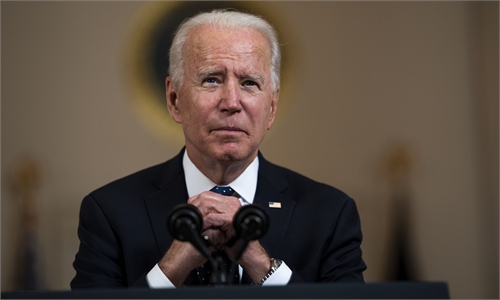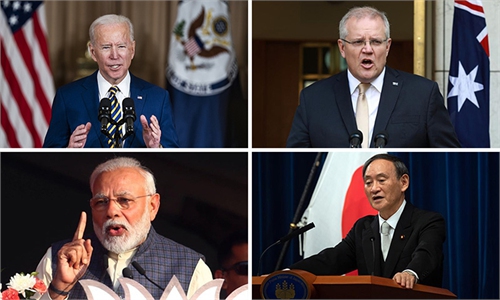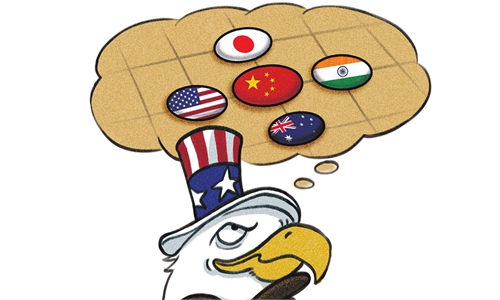Quad ‘incapable of inflicting substantial harm to China’
Members to become US ‘cannon fodder’ to contain Beijing
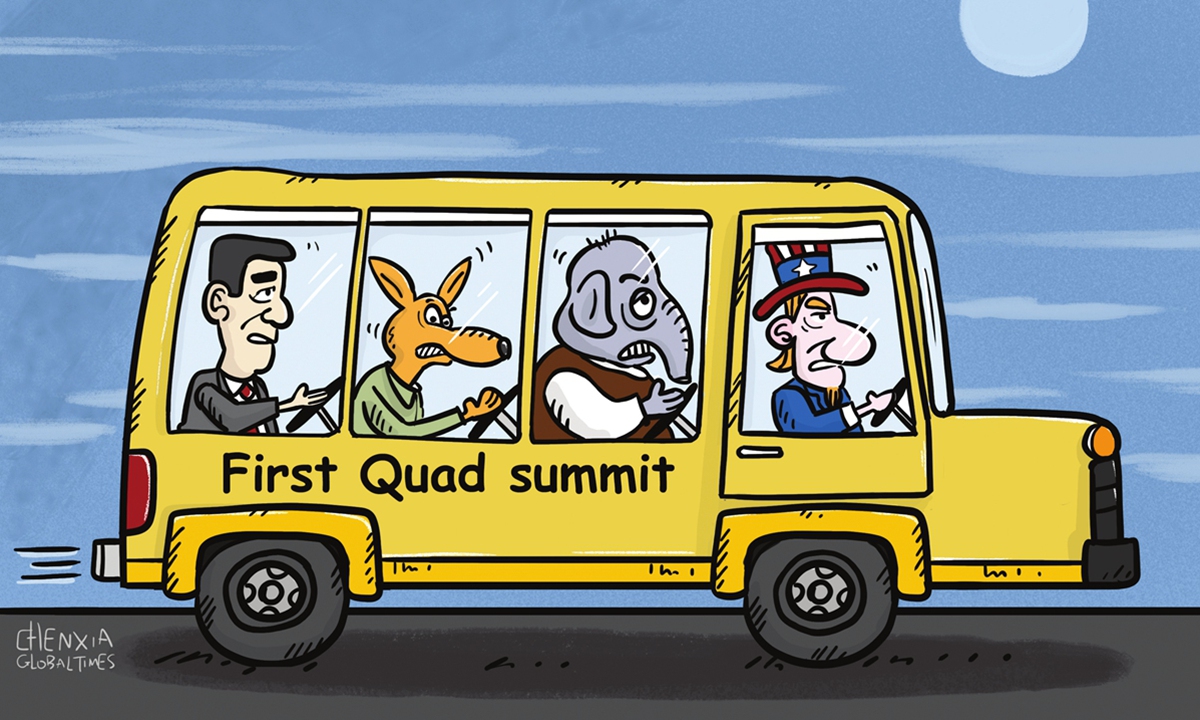
First Quad summit Illustration: Chen Xia/GT
The Quad summit, scheduled to take place on Friday, which will likely mention marine security concerns for the purpose of containing China and demonstrate that the Indo-Pacific is the current strategic center of the US, was at the stage of forging verbal consensus rather than signing substantial deals, Chinese analysts said on Thursday, noting that US typical practice of abandoning its allies like dumping trash in front of its interests will make Quad another NATO which is existing only in name.
While the Quad mechanism is engaged in splitting Asia and instigating various forces to contain China, if Japan, India and Australia went too far in following the US strategy of containing China, they will become cannon fodder as China will resolutely safeguard its interests, Chinese analysts warned.
Leaders from the US, Japan, India and Australia - four countries that make up the Quadrilateral Security Dialogue (the Quad) will meet in Washington on Friday for the first in-person Quad summit.
Ahead of the meeting, Japan has been sparing no efforts to be the biggest agitator for Friday's Quad summit with its Prime Minister hyping the Chinese military threat before leaving for Washington and its extensive media coverage to provoke East and South China Sea issues. The move is seen by Chinese analysts as sacrificing Japan's diplomatic independence for the sake of tying itself tightly with the US to get a bigger say and upper hand in Northeast Asian affairs, which may not be easy to achieve.
Before heading to Washington for Friday's first-ever in-person summit, Japanese Prime Minister Yoshihide Suga hyped the Chinese military threat in an interview with Bloomberg, in which he said China's rapidly growing "military influence and unilateral changing of the status quo" could present a risk to Japan, and Japan is closely monitoring the military balance between the Chinese mainland and Taiwan island.
Apart from Suga, the upcoming Quad summit also attracted extensive coverage from Japanese media which cooperated with Suga on hyping the Chinese military influence.
Kyodo News citing anonymous sources said on Wednesday that the joint leaders' statement of the Quad summit will use tougher language than before on the South China Sea and East China Sea.
"Quad members oppose challenges to the maritime rules-based order, particularly in the East and South China seas," Kyodo News said.
Lü Xiang, a research fellow at the Chinese Academy of Social Sciences, told the Global Times on Thursday that Suga's remarks and Japanese media's extremely wide coverage on the summit revealed that Japan has pinned much hope on the summit and to some extent Japan's expectations to the summit are even bigger than the US', which will host the meeting.
As the main agitator for Quad, Japan has been sparing no efforts to promote the summit to use the clique to gain an upper hand in its territorial disputes with China and Russia, and even on the Korean Peninsula issue. And the more it smears China on the South China Sea and East China Sea, the more it will gain US support, Li Haidong, a professor at the Institute of International Relations of the China Foreign Affairs University, told the Global Times on Thursday.
"Disclosure on the joint statement and Suga's hype was to incite and show loyalty to the US as Japan hopes to tie itself tightly to the US chariot to get a more prominent international status and a bigger say in Northeast Asia. Japan wants American troops to stay in the country and South Korea, but whether Biden, facing internal and external unprecedented plight, would choose to further provoke China remains a question," Lü said.
Lü said the joint statement will be weaker than what Japanese media claimed, and said the summit was unlikely to achieve a substantive agreement.
The summit is also headlines in Indian media. On Thursday, Indian Prime Minister Narendra Modi arrived in Washington, and although not mentioning China, he said his visit was an "occasion to strengthen our strategic partnership with the US and consolidate ties with Japan and Australia," NDTV reported on Thursday.
India has been active in Quad, hoping to use the US, Japan and Australia to contain China. But the US was more likely to adopt an "Asians versus Asians" strategy, indicating it will instigate some Asian countries to confront other Asian countries rather than engaging itself in it, analysts said, noting that India is not sure how much help it can get from the US if there is a serious conflict between China and India.
Compared with the China topic, the four members worry more about COVID-19, vaccines, climate change and carbon neutralization which they hope to seek global leadership, Shi Yinhong, director of the Center for American Studies at Renmin University of China, told the Global Times.
In a statement issued last week, the White House said the Quad leaders will be focused on deepening ties and advancing practical cooperation on areas such as combating COVID-19, addressing the climate crisis, partnering on emerging technologies and cyberspace, and promoting a free and open Indo-Pacific, without mentioning China.
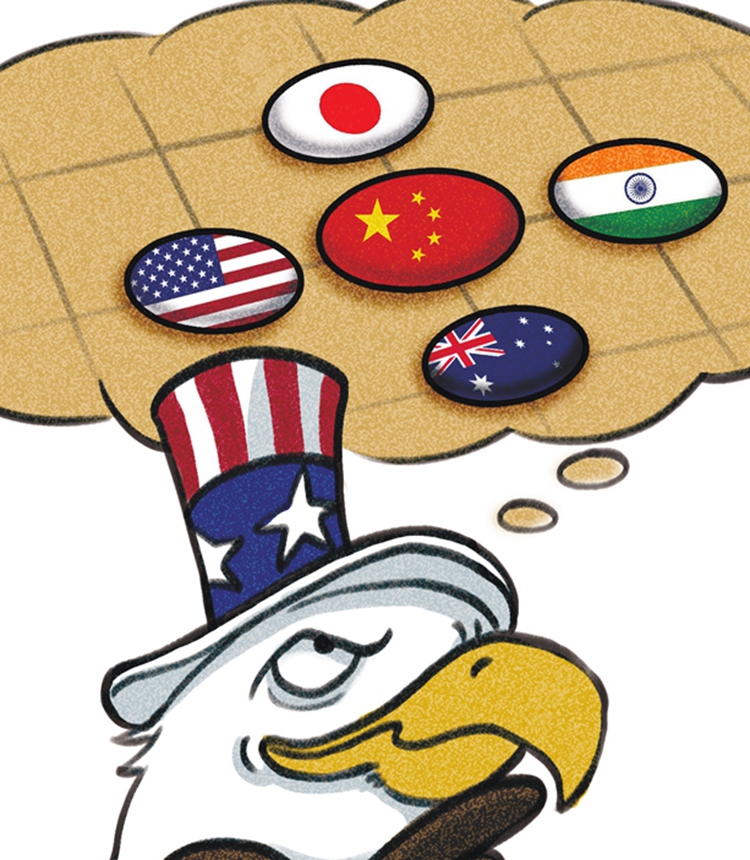
Photo: Quad
Another NATO?
The summit will take place just days after the US, UK and Australia announced a security pact AUKUS, under which Australia will be provided with nuclear-powered submarines after ripping up its deal with France, which prompted France to recall its ambassadors to the US and Australia and greatly upset Europe.
The AUKUS cast a shadow over the Quad summit, and will dilute the Quad members, especially Japan and India, and make the summit less effective, analysts said.
Yang Xiyu, a senior research fellow at the China Institute of International Studies in Beijing, told the Global Times that the two strategic platforms Quad and AUKUS make up the US Indo-Pacific strategy with a global perspective, indicating that the US made the Indo-Pacific region its strategic priority.
At this moment, the AUKUS cannot affect the alliance between the US and Japan or India, though the transatlantic partnership is largely influenced, Yang said.
But the US Indo-Pacific strategy serves its own interests, and Biden could abandon its European allies like dumping trash just months after bluffing "America is back in Europe" during his European visit. It is capable of throwing any other ally away at any time for the sake of American interests, Lü said.
US betrayal of its allies has unsettled and created chaos among them.
French President Emmanuel Macron, upset by AUKUS, called Modi on Tuesday to discuss cooperation in the Indo-Pacific region, a move Lü said was to ensure that India will not become another Australia to rip up their military pact.
The Hindustan Times reported that India sought to distance itself from AUKUS "because of its strong strategic relations with Australia, France and the US."
Calling the four members "four ward mates with four different diseases," Lü said that the Quad will not have long-term strategic value, just like NATO, which now exists only in name.
Biden went way too far in the road of "American First" than Donald Trump, and he has lost his credibility not just in his failure of the COVID-19 response but in treating its allies, and will likely suffer setbacks in the midterm elections next year, analysts said.

